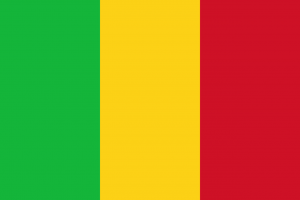Language/Bambara/Vocabulary/How-to-Say-Hello-and-Greetings
Hi Bambara learners! 😃
Bambara is a national language of Mali spoken by 15 million people.
It is estimated that about 80 percent of the population of Mali speak Bambara as a first or second language!
Greetings are an important part of any language because they allow you to connect and communicate with others.
If you’re planning a trip to Mali or are trying to learn Bambara, keep reading to discover some of the most important greetings.
Let’s get started! 🤗
Greetings[edit | edit source]
| English | Bambara |
|---|---|
| general greeting to one person | I ni bara |
| general greeting to a group of people | Aw ni bara |
| general greeting to one person | I ni ce |
| general greeting to a group of people | Aw ni ce |
| morning greeting to one person | I ni sɔgɔma |
| morning greeting to a group of people | Aw ni sɔgɔma |
| noontime greeting to one person | I ni tile |
| noontime greeting to a group of people | Aw ni tile |
| afternoon greeting to one person | I ni wula |
| afternoon greeting to a group of people | Aw ni wula |
| nighttime greeting to one person | I ni su |
| nighttime greeting to a group of people | Aw ni su |
| reply spoken by a man | Mba |
| reply spoken by a woman | Nse |
| how are you? spoken to one person | I ka kεnε? |
| how are you? spoken to one person | I ka kεnε wa |
| how are you? spoken to a group of people | Aw ka kεnε |
| how are you? spoken to a group of people | Aw ka kεnε wa |
| reply to I ka kεnε, I ka kεnε wa, Aw ka kεnε, and Aw ka kεnε wa | Tooro si te |
| reply to I ka kεnε, I ka kεnε wa, Aw ka kεnε, and Aw ka kεnε wa | Kεnε, tɔɔrɔ te |
| how are you? in the morning ("was your night peaceful?") | Hεrε sira? |
| how are you? in the evening ("was your day peaceful?") | Hεrε tilenna? |
| reply to Hεrε sira and Hεrε tilenna | Hεrε doron |
| reply to Hεrε sira and Hεrε tilenna spoken by a man | Hεrε mba |
| reply to Hεrε sira and Hεrε tilenna spoken by a woman | Hεrε nse |
| welcome greeting spoken to one person | I bisimila |
| welcome greeting spoken to a group of people | Aw bisimila |
| reply to I bisimila and Aw bisimila | Saha |
| What's your name? | I tɔgɔ? (Whats your first name?)
I jamu? (Whats your surname?) |
| My name is ... | Ne tɔgɔ ...
Ne jamu ... |
| Where are you from? | I bɛ bɔ min? |
| I'm from ... | N bɛ bɔ ... |
| Goodbye
(Parting phrases) |
K'an bεn (inf)
N taara |
| Have a nice day | Da no nkɔ yie mma wo! |
| Bon appetit /
Have a nice meal |
K'i ni hɛrɛ bɛn
Ka su maya aw kono |
| Bon voyage /
Have a good journey |
Ka taa ni ka segin nɔgɔya
Ka sira diya (Have a good trip) Ka se n'i nyuman ye (May you arrive well) Ka segin n'i nyuman ye (May you return well) |
| Yes | Awɔ |
| No | Ayi |
| Sorry | A yafa n ma
Hakɛto m'a famu |
| Please | Hakɛto |
| Thank you | I ni ce (sg)
Aw ni ce (pl) I ni baraji (sg) Aw ni baraji (pl) |
| Reply to thank you | Basi tε (No problem)
Nba |
| Christmas greetings | I ni san kura (sg)
Aw ni san kura (pl) Noɛli hɛrɛ ani |
| New Year greetings | Hnit thit ku mingalar pa
Kura hɛrɛ |
| Easter greetings | Paki seli hɛrɛ |
| Birthday greetings | Sanbε sanbε |
Sources[edit | edit source]
Free Bambara Lessons[edit | edit source]
Language Exchange[edit | edit source]
Forum[edit | edit source]
Tools[edit | edit source]
Marketplace[edit | edit source]
Videos[edit | edit source]
How to greet in Bambara/Dioula [Part 1/2] - YouTube[edit | edit source]
Other Lessons[edit | edit source]


